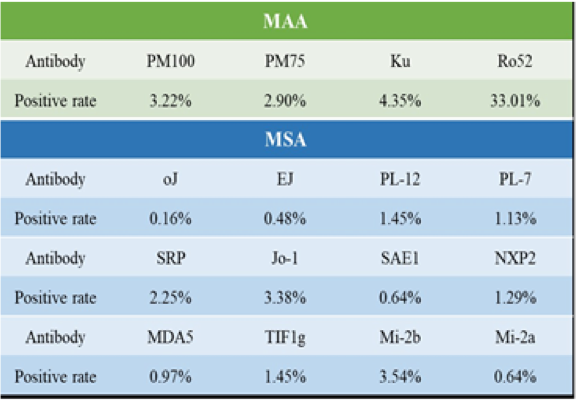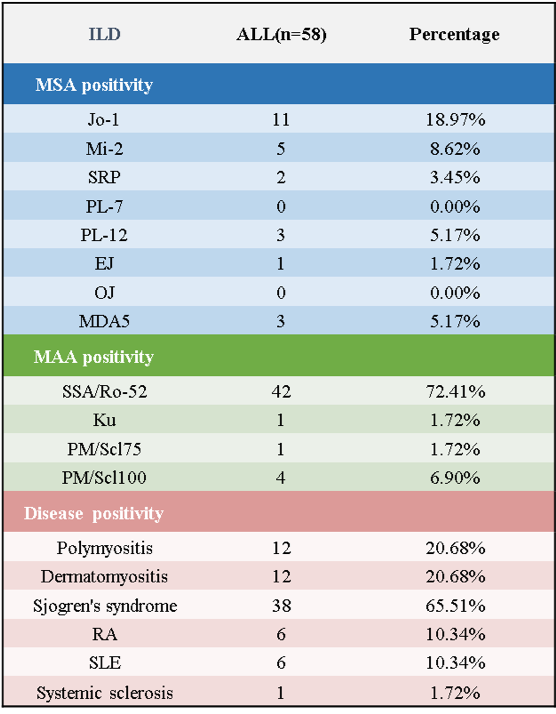Session Information
Session Type: Poster Session (Tuesday)
Session Time: 9:00AM-11:00AM
Background/Purpose: Interstitial lung diseases (ILD), a heterogeneous group of pulmonary disorders, originated from idiopathic causes or secondary to certain etiologies, such as infectious diseases, drugs, or connective tissue diseases (CTD). Common causes of CTD associated ILD (CTD-ILD) include rheumatoid arthritis (RA), systemic lupus erythematosus (SLE), systemic sclerosis (SSc), polymyositis (PM), dermatomyositis (DM), and Sjogren’s syndrome (SS). Specific autoantibodies in autoimmune rheumatic diseases (ARD) are clinically useful biomarkers associated with a particular disease and/or clinical manifestations. Myositis-specific autoantibodies (MSAs) and myositis associate autoantibodies (MAAs) have been applied for the diagnosis of PM/DM. MSAs were defined as autoantibodies relatively specific for PM/DM, while MAA could not only be identified in PM/DM but also could be noticed in other autoimmune rheumatic diseases. Some MSAs and MAAs have been detected in patients with ILD and PM/DM simultaneously or idiopathic ILD patients. However, the prevalence of MSAs and MAAs in CTD-ILD is lacking.
Purpose
This study aimed to define the prevalence of MSAs and MAAs in patients with clinical symptoms of ILD in the presence of a particular autoimmune rheumatic disease and to identify the correlation between the presence of MSA/MAAs and ARD specific autoantibodies (autoAb).
Methods: 413 subjects who had been diagnosed with at least one of autoimmune rheumatic diseases, including RA, SLE, PM, DM, and SS were included in this prospective study at a single medical center between February 2018 and October 2018. All enrolled patients had experienced clinical evidences of pulmonary diseases and were suspicious of ILD, such as exertional dyspnea or abnormalities on the chest plain film. Serological immunotherapy strips were performed to detect MSA/MAAs. These patients received imaging examinations as well. Correlation analysis was performed among the different collected variables.
Results: The diagnosis of CTD-ILD were confirmed in 58 of 413 patients. The prevalence of MSAs and MAAs were 16.4% and 39.9%, respectively. The most frequently found autoantibody was anti-Ro-52 (33%), followed by anti-Ku (4.35%), anti-Mi-2 (4.1%) , anti-Jo-1 (3.38%), anti-PM/Scl100 (3.22%), anti-PM/Scl75 (2.9%), anti-SRP (2.3%), and anti-PL-12 (1.5%)(Table 1).
To our surprise, SS is the most common disease in these patients with CTD-ILD, followed by PM/DM. MSA/MAAs were identified in patients withRA and SLE relevant ILD (Table 2). Anti-SAE1 and anti-Ku autoAb are positively corelated with anti-RNP autoAb (Phi = 0.323 and 0.246, p = 0.012 and 0.045, respectively). Anti-MDA5 autoAb seems to be possibly associated with anti-La autoAb (p = 0.08)
Conclusion: Our data indicates that MSA/MAAs could be able to detected in CTD-ILD in addition to PM/DM-ILD. The diagnostic criteria of CTD-ILD is unavailable except patients have obvious clinical evidences and imaigings’ manifestations. Define how the presence of serum MSA/MAAs are relevant to CTD-ILD could help contribute to early diagnosis and prevent poor prognosis and is warranted in the future.
To cite this abstract in AMA style:
Cheng C, Ju W, Lee T, Chao E, Chen H, Liu F, Chang D, LU C. Serum Myositis Specific/associate Autoantibodies Help Identify Early Connective Tissue Diseases Relevant Interstitial Lung Diseases: A Medical Center Experience [abstract]. Arthritis Rheumatol. 2019; 71 (suppl 10). https://acrabstracts.org/abstract/serum-myositis-specific-associate-autoantibodies-help-identify-early-connective-tissue-diseases-relevant-interstitial-lung-diseases-a-medical-center-experience/. Accessed .« Back to 2019 ACR/ARP Annual Meeting
ACR Meeting Abstracts - https://acrabstracts.org/abstract/serum-myositis-specific-associate-autoantibodies-help-identify-early-connective-tissue-diseases-relevant-interstitial-lung-diseases-a-medical-center-experience/


